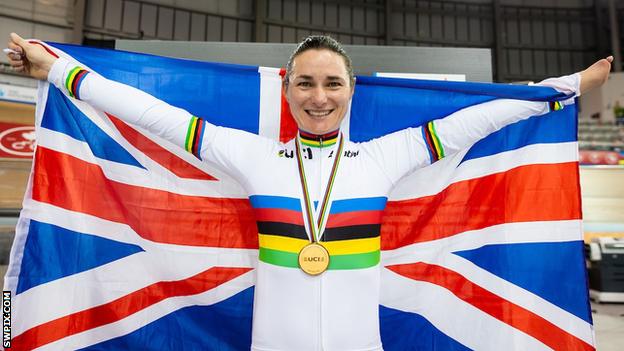Sarah Storey: Tokyo Paralympics 'not necessarily' Para-cyclist's last Games
Last updated on .From the section Disability Sport

Sarah Storey says next year's Tokyo Paralympics - her eighth Games - won't necessarily be her last.
Cyclist Storey, Britain's most successful Paralympian with 14 golds in cycling and swimming, first competed at Barcelona 1992.
She will be 43 when she competes on the opening day of the rearranged Games.
"Tokyo will be my eighth Games and I think having to wait another year is just one of those things, it hasn't changed my motivation," she said.
Speaking to BBC Sport, she added: "I don't think Tokyo was necessarily going to be the end, I think in some way I'll always race, but whether I race internationally, who knows.
"I've never been one to make a decision until after the Games anyway, whether that was a decision to have a baby, a decision to carry on, a decision to switch sports, or move from track more onto the road.
"I'll just wait another year, my body is still well and my mind is definitely still there, and I still feel like I was improving [before lockdown]."
'It's a concern that the Paralympic movement will move backwards'
Storey could add to her gold-medal haul on the first day of the Paralympics - postponed by a year because of the global coronavirus pandemic - when she competes in the C5 3000m pursuit.
But the Games in 2021 could look very different to her previous seven. Earlier in August, Tokyo organisers said the Games may require specific Covid-19 measures to keep athletes safe.
Storey says she would be willing to go into some form of isolation if required to allow a safe 'bubble' to be formed around the competition.
"There are so many different considerations but I think it's certainly possible for the Games to go ahead with a bubble around it in some way, shape or form, and it's just about each of those nations getting a handle on what they are doing with their competitors ahead of travel or whatever," she said.
"It's been heartening to see how things have worked out for the cricket and the football, and how that's been really positively worked on and the different strategies they have got there.
"In terms of the way it's been approached, I don't think it could have been done in any other way."
A 'scaled-down' version of the Games is being considered by the International Paralympic Committee and Tokyo organisers, and though it is unknown what exactly that would entail, it could include limiting the number of spectators at competition venues or reducing the number of staff and delegations from individual countries.
"We need to understand exactly what the scaled-down version means," Storey said.
"If it's health and safety reasons meaning there needs to be fewer spectators, we're used to seeing crowds that are really well packed together for Paralympic Games, but then we go to World Championships and it's one man and his dog and your own family, and that's pretty much it.
"So we have this contrast anyway in a Paralympic cycle, and it would be nice to think we could build on that and make the four years in between the Games more so that people could follow that journey, because you'd be surprised how many people don't think we really race between Paralympics, whereas I would generally race at least once a week if not more in a normal road racing season.
"I think it is a concern that we will move backwards, but hopefully we can still maintain that media interest and coverage.
"It was supposed to be a Games that would maximise technology, so maybe this is the opportunity to really turbo-charge that technology and make sure we can be in every household around the world who has internet and television to make sure that nobody misses out on the action, even if it has to be scaled down on the ground."

- BBC Food: Calculate how to lose belly fat in four weeks
- Covid-19 Redundancy: From a dream job to KFC




















